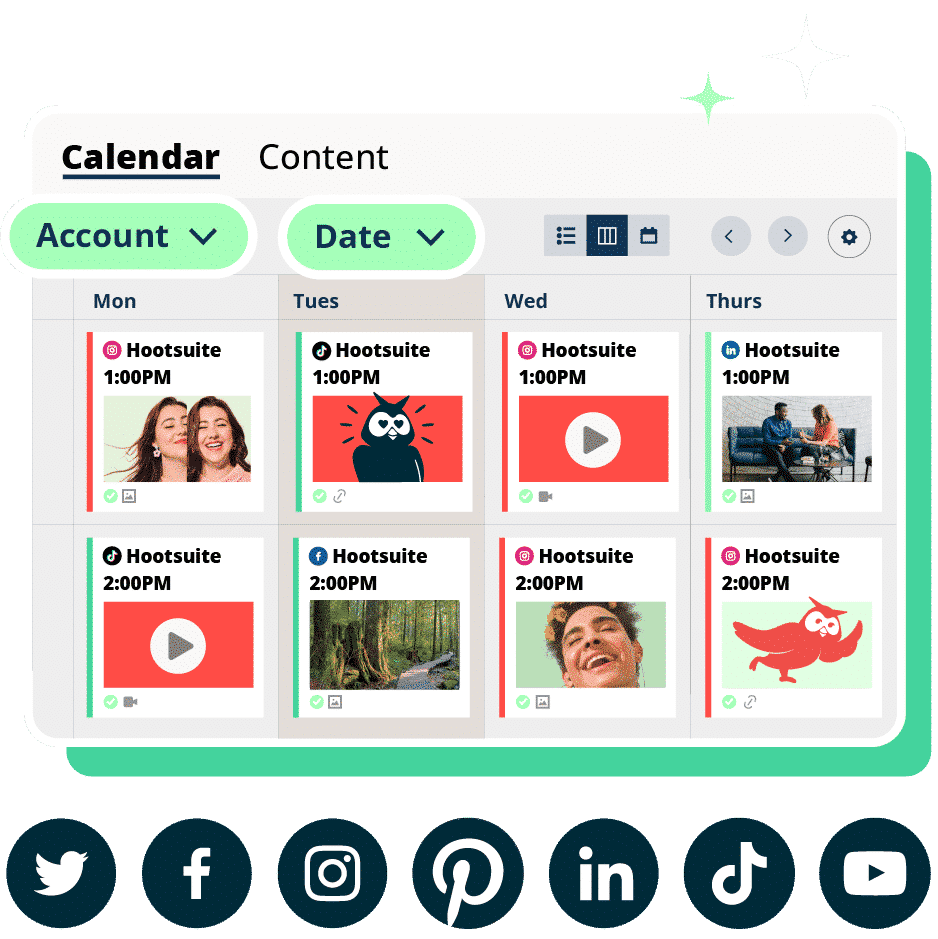Friday, January 31, 2025
Trinity Fruit Co. adds social media and PR specialist - The Packer
* This article was originally published here
Thursday, January 30, 2025
Wednesday, January 29, 2025
Tuesday, January 28, 2025
Monday, January 27, 2025
How to make a social media posting schedule [Free template]
TL;DR: Here’s how often you should post to each social network for best results:
- Instagram: Post between 3 and 5 times per week.
- Instagram Stories: Post 2 times per day.
- Facebook: Post between 1 to 2 times per day.
- X (Twitter): Post between 2 and 3 times per day.
- LinkedIn: Post between 1 to 2 times per day.
- Threads: Post between 2 to 3 times per day.
- TikTok: Post between 3 and 5 times per week.
- Pinterest: Post at least 1 time per week.
A social media posting schedule is a strategic plan for your social media account(s) that determines what content you’ll post, when you’ll post it, and on which platforms.
Of course, social media platforms like Instagram, Facebook and TikTok can be used spontaneously — but for brands looking to build engagement, awareness and a loyal following, consistency and quality are key. And that requires some foresight.
Social media posting schedules are really helpful for a bunch of reasons:
- Managing your time. Especially if you’ve got limited resources, batch-preparing your social media posts can save you tons of time. (And make the most of those days when you’re feeling extra creative.)
- Keeping your feeds active and fresh. Instead of just hoping that you can squeeze in some posts when you remember (never), scheduling regular posts ensures your feeds are active and visible.
- Mixing it up. When you plan ahead, you can’t accidentally post two Minions memes in a row. Scheduling posts allows you to prepare a balanced mix of topics and content styles — a sprinkling of prank Reels here, an informative Carousel there.
- Optimizing your accounts. Analyzing performance is way easier when you post consistently. For instance, if you always post an Office Outfit of the Day on Mondays, and that’s the day with your best traffic, you’ve got a great hint about what kind of content your audience might want more of. (Fashionista alert.)
A strong social media posting schedule doesn’t just include what days of the week your team should be posting. It also covers the frequency of your posts, the ideal content mix, the best times to post on social… details which will likely be unique for each platform your brand is using.
That may sound like a lot, but with the right tools — like a free social media posting schedule template, an awesome scheduling dashboard and (ahem) a helpful blog post — you’ll be scheduling up a storm in no time.
When and how often should you post on social media?
It’s probably not the answer you want, but the truth is, how often to post on social media is totally unique to each brand or person.
That said, here are some very general guidelines according to Hootsuite’s expert research.
- Instagram: Post between 3 and 5 times per week.
- Instagram Stories: Post 2 times per day.
- Facebook: Post between 1 to 2 times per day.
- X (Twitter): Post between 2 and 3 times per day.
- LinkedIn: Post between 1 to 2 times per day.
- Threads: Post between 2 to 3 times per day.
- TikTok: Post between 3 and 5 times per week.
- Pinterest: Post at least 1 time per week.
While these are our official recommendations for the minimum number of posts you should publish per week, our research from Q4 of 2024 shows that most businesses are a lot more active on social:

Of course, take all these numbers with a giant grain of salt — your mileage will vary depending on your unique audience, location and type of business.
Realistically, you also just might not have the resources to churn out five TikToks a week if you’re a small business — and that’s okay. It’s far better to stick to a manageable schedule than risk burning yourself out and giving up.
Try the suggestions above as a starting point, and keep an eye on your own analytics to see what’s actually working and what isn’t.
Does your reach go up or down if you post three times instead of two on X? What happens if you post five times a week on Pinterest?
Experiment, observe and find your own personal set of best practices that achieve real reach in the real world.
Oh, and if you want to do your own research into the algorithms, check out our detailed posts for each social platform:
- Instagram algorithm guide
- Twitter algorithm guide
- Facebook algorithm guide
- YouTube algorithm guide
- TikTok algorithm guide
- LinkedIn algorithm guide
How to come up with the perfect social media post schedule in 5 steps
Step 1: Define your goals
“What is the point of all this?” may seem like a heavy question to contemplate, but it’s vital for defining the direction of your social media marketing strategy — and posting schedule.
Do you want to grow your audience? Increase your sales? Build brand awareness? Reach a specific target demographic?
Your goals can impact the formats and types of content you post, what platforms you’ll want to focus on, and the timing of your posts, so take a beat to think through the big “why” before you start making decisions.
Here’s a guide to setting — and exceeding — social media goals to get you started.
Step 2: Find out when your audience is online
The best time to post on social media is the day and time when your audience is most likely to see it. Figuring out when, exactly, that is will help you create a social posting schedule with maximum exposure.
This may require some trial and error, experimenting with different days of the week and different times of day, but your analytics should point you in the right direction to start.
Hootsuite Analytics can show you information about your audience’s typical behavior. Maybe you’ll learn that they’re most active during their morning commutes or that they love to scroll before bed.
Step 3: Plan how often to post
Get familiar with the best practices of each platform via our guide to how often to post on social media, then decide what actually works for you.
Be real with yourself. Do you actually have the resources to post 15 times a day on TikTok?
Even with tools like Hootsuite’s OwlyWriter AI caption writer or free graphic design software, it takes time to get your social media strategy right.
Be honest about what you have the time (or budget) to tackle, then let the rest go. You don’t have to do everything! Go for quality over quantity.
Step 4: Develop your content calendar
You can cross your fingers and hope you’ve got a great content idea ready every day at your designated Post O’Clock. Or you could do some prep work.
Even if you just plot out what type of content you’d like to post each day, you’ll save yourself creative brain power later.
Maybe you want to reserve Mondays for Q&As with brand ambassadors; Wednesdays for infographics; and Fridays for recipes. (We’re not sure what this hypothetical business is but we love the diversity here.)
With this template plotted out, you can just fill in the blanks each week without stressing.
You can also note important upcoming dates or campaigns that could inspire your content creation process — whether that’s National Donut Day or an annual pledge drive.

Snag a social media content calendar template here and get brainstorming.
Step 5: Analyze your results
Your social media posting schedule should be an ever-evolving game plan, informed by what’s working and what isn’t.
Check your metrics regularly and tweak as required to improve performance. You can use each platform’s internal insights, or view them all in one place (and even schedule handy reports) using Hootsuite Analytics.

How to schedule posts on social media using Hootsuite
Streamline your social media posting with the help of Hootsuite’s scheduling feature, which is designed to help you keep on top of your schedule for all your favorite social platforms.
Here’s how to schedule social media posts with Hootsuite.
1. Connect your social media accounts to Hootsuite
Before you can start scheduling posts to your social media accounts, you’re going to want to make sure they’re connected to Hootsuite.
First, open your Hootsuite dashboard and navigate to your profile icon (it’s in the bottom left corner).
Next, select Social accounts and teams and connect your desired platforms. (Options include Instagram, Facebook, Twitter, and more.)

2. Create your posts
Once your accounts are connected, it’s time to draft your post.
To begin, click on the plus icon (Create) on the left side of your Hootsuite dashboard and select Post (or Pin if you’re making a Pinterest post). Alternative option: You could also click the Create a Post button on the top right.

Use the drop-down menu under Publish to to choose a social media account. If you’d like, choose multiple accounts to cross-post. (You can customize each post to optimize for specific platforms later on.)
 Now draft your post — add copy, upload images and videos, post links and more. You can even access a stock media library, or get some caption prompts from Owly Writer AI in just a few clicks.
Now draft your post — add copy, upload images and videos, post links and more. You can even access a stock media library, or get some caption prompts from Owly Writer AI in just a few clicks.

You can also easily set up approval workflows. If you’ve got any relevant stakeholders who need to give your post the thumbs-up before it goes live, add their names under Ask for approval.

Want to invest a little cash in your post to increase its reach? Use the Hootsuite functionality by ticking the Promote this post box.

Now that you’ve got your base post ready to go, head back to the compose field and toggle between your different platform accounts to optimize for each account. (For instance, making sure you’ve met the character limits for each platform.)

3. Choose the best time to post
Once you have high-quality content, it’s time to decide what time to publish your post.
You can hit the Schedule for later button to see some suggestions for the best time to post, based on when your target audience is most likely to be online.
Pick your fave, or tap Manually set time if you’d rather pick your own specific moment to drop your masterpiece.

You can also see the best time to post by going to Analytics in the sidebar navigation and then tapping Best time to publish, underneath the Organic Reporting heading. Here, you’ll see heat maps showing your audience’s activity over the past 30 days.
You can also check out this blog on the best times to post on every social media channel for more insights.

4. Schedule your post
Okay, you’ve decided when you want your post to go up. Stop thinkin’ about it, and click Done and Schedule! (Or post it live immediately if you can’t wait another second.)
Now it’s hanging in the queue, waiting for its time to go live.

5. View your social media calendar
Head over to the Hootsuite planner to review your scheduled posts or make any adjustments.
It’s a calendar view of your upcoming posts, so you can see at a glance what’s coming up, and move things around or edit content as needed. Easy!

Free social media post schedule template
You’ve now got all the knowledge you need to get started with your social media schedule.
You’ve got your social content strategy all set, and you know exactly how to find the best times to post for your unique audience on social media. You’re pumped to use scheduling software to keep your game plan organized.
It’s time to pull it all together and put the best social media schedule into action.
Download our free social media posting schedule template. We built it in Google Sheets so you can customize it and collaborate with your marketing team.
We think it’s pretty straightforward to use. Make a copy of it in Google Sheets, or download it as an Excel sheet.
At the bottom, you’ll see tabs for Strategy, a Monthly View, a Weekly View and an Evergreen Content Library.

Use the Strategy tab to make note of your business goals, social media goals, and content pillars. You can also include up to six pieces of cornerstone content that you’ll promote this year.
Use the Monthly view tab to get an overview of upcoming key dates, holidays, or events, as well as your cornerstone content pieces and the tactics you’ll be using to support them.
The Weekly view is great for content planning and figuring out your exact posting schedule for the week.
Use the Evergreen content library to keep track of valuable and successful posts you might want to recycle or repost in the future.
That’s it… you’re off the races! Happy strategizing and scheduling, friends.
The top 5 social media scheduling tools for 2025
1. Hootsuite
Look, we’re not too shy to say it: We think Hootsuite is the best, most intuitive social media management tool and social media scheduling tool around.
It’s suitable for marketing teams of all sizes, with options ranging from affordable basic social media marketing tools all the way up to enterprise-level collaboration tools for complex organizations and very large teams.
Features
Hootsuite supports all the scheduling functions you could need, from straightforward auto-posting, through bulk scheduling to custom recommendations on the best time to post based on your own social media analytics and results.
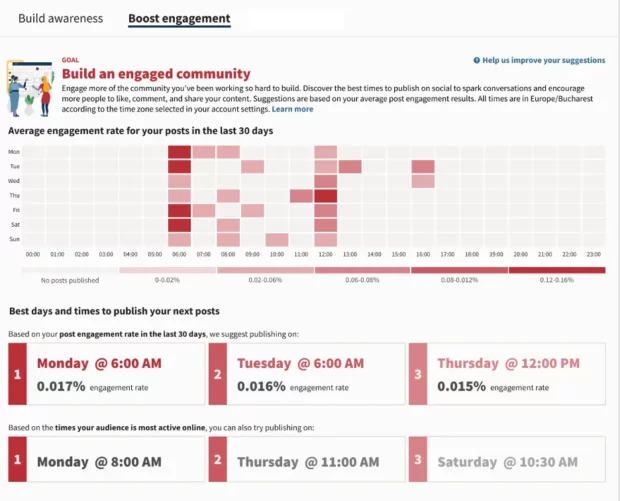
You can also customize and schedule one post for various social media profiles and platforms, all from one screen. This approach is much more effective than simply cross-posting the same content across multiple accounts.
Hootsuite has the added bonus of offering detailed metrics that help inform your social media scheduling, as well as powerful content creation tools (including a handy AI assistant — say hi to OwlyWriter AI), hashtag suggestions, and a simple drag-and-drop calendar view that makes content planning across all your accounts easy.
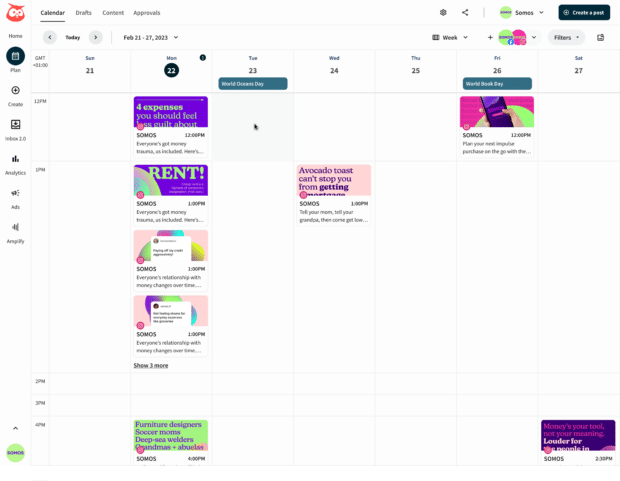
Platforms supported
Hootsuite supports scheduling to the following social networks. (Click on each link for more specific details on how to schedule content for each platform.)
- Instagram (Posts, Stories, and Reels)
- X (Twitter)
- YouTube
- TikTok
- Threads
Plus, Hootsuite boasts 100+ key integrations in its app directory — so if the feature you want doesn’t exist, you’re sure to find a plug-in that can help.
Pricing: Hootsuite plans start at $99 per month.
2. Later
Later is a social media management platform similar to Hootsuite (you can compare Later and Hootsuite here).
Later comes with a variety of features, from analytics to scheduling tools. But it really shines through as a platform for smaller brands and creators who like to visualize and preview social media content before they post.
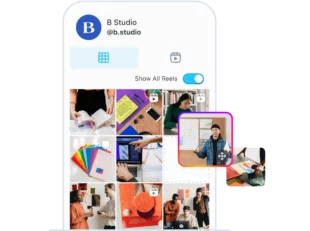
If you want to give your Instagram feed a little razzle-dazzle, Later has some neat extras. They offer an Instagram feed planner that lets you visualize exactly how your Instagram grid will look after you post. It’s a nice way to give your grid a quick rebrand and make it stand out.
Pricing: Later’s most basic plan starts at $25 USD/month (but its features are pretty limited)
3. Canva
You likely already know Canva is the design-savvy social media manager’s best friend.
The easy-to-use graphic design tool has revolutionized the way we create content, which is why we permanently added Canva to the Hootsuite dashboard. (There are even customizable Canva templates built right into Hootsuite Composer).
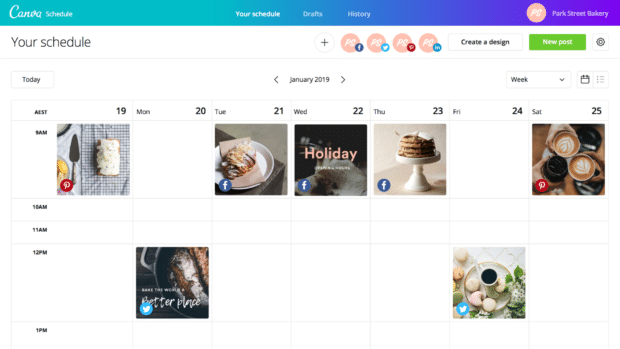
But did you know that Canva Pro also includes a social media scheduler and planner?
Canva Pro includes posting capabilities for Facebook, Instagram, X and Linkedin. Within the Canva Pro dashboard, you can also track engagement, likes, clicks, impressions, and more to see how you’re performing.
Pricing: Canva Pro costs $120 USD/year for a single person. Canva Teams is $100 USD/year per person.
4. HubSpot
Although it’s perhaps best known as a customer relationship management (CRM) platform, HubSpot also offers its own digital marketing software that may serve your needs.
Like many of the aforementioned tools, HubSpot’s social media scheduler is designed to help you manage all your campaigns from one place. It allows you to publish content to LinkedIn, Facebook, Instagram, and Twitter and schedule your content to go live at the best possible time.
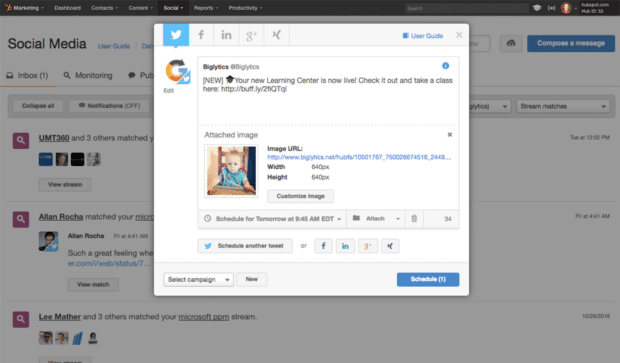
Pricing: HubSpot Marketing Hub‘s Professional plan includes 3 seats for $890/month.
5. Buffer
Buffer is another social media scheduler that comes with tools to help you build your presence on social media.
It allows you to schedule posts to Instagram, Facebook, X, TikTok, LinkedIn, YouTube, and Mastodon. You can also use it to reply to comments on Facebook Pages and Instagram business accounts.
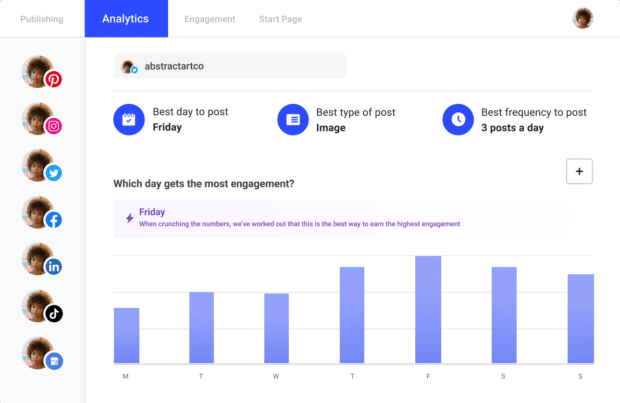
When it comes to all-in-one platforms, Buffer is relatively light on features. It doesn’t offer analytics for all platforms and doesn’t come with any social listening capabilities. However, Buffer’s user-friendly dashboard is simple and straightforward, making it great for social media managers who just want to get in, schedule, and get out.
Be sure to read our guide to Hootsuite vs. Buffer for more on how these platforms compare.
Pricing: Buffer has a (limited) free plan and offers scheduling for 1 channel starting at $5/month.
Save time managing your social media presence with Hootsuite. Publish and schedule content, find relevant conversions, engage your audience, measure results, and more — all from one simple dashboard. Try it free today.
The post How to make a social media posting schedule [Free template] appeared first on Social Media Marketing & Management Dashboard.
* This article was originally published here
Sunday, January 26, 2025
Saturday, January 25, 2025
The best time to post on Instagram: Q1 2025 update [DATA]
What is the best time to post on Instagram to make sure a post gets seen?
And what about the best time to post on Instagram for likes, comments, shares, and sales?
The Instagram algorithm prioritizes recency, so posting when your followers are online is key. This means that, if all else is equal, a newer post will show up higher on the newsfeed than an older one.
Recency is honestly one of the quickest, easiest wins when it comes to optimizing a post for success. (Though we have plenty more tips on getting free Instagram likes if you’re interested).
Of course, all businesses and audiences are different, so we’ll also help you calculate your brand’s unique best times to post.
Keep reading for the most recent available data (collected in Q4 of 2024).
Note: Unless stated otherwise, the time of day was localized across 118 countries where sample data came from, i.e. the graphs below are accurate across time zones.
The overall best time to post on Instagram
To find these results, we analyzed data from over 1 million social posts from businesses of all sizes. Then, we consulted with our own social team for insights gained from posting to an audience of 170k followers.
(Drum roll, please…)
The universal best times to post on Instagram are:
- 3 pm to 9 pm on Mondays
- 5 am to 8 am and 3 pm to 7 pm on Tuesdays
- 5 pm to 7 pm on Thursdays

Planning on posting more than once a week? Here’s a breakdown of the best times to post on Instagram for each day of the week.
| Day of the week | Time |
|---|---|
| Monday | 3 pm to 9 pm |
| Tuesday | 5 am to 8 am / 3 pm to 7 pm |
| Wednesday | 5 pm |
| Thursday | 4 pm to 5 pm |
| Friday | 4 pm |
| Saturday | 11 am / 5 pm |
| Sunday | 12 pm to 3 pm |
If you’re just starting off on Instagram and don’t have a lot of past data or audience insights to work with, try posting around these peak times.
As your account grows, we recommend tweaking your posting schedule to fit your specific audience’s activity patterns. Use Hootsuite’s Best Time to Post heatmaps to learn exactly when your audience is online and most likely to engage.

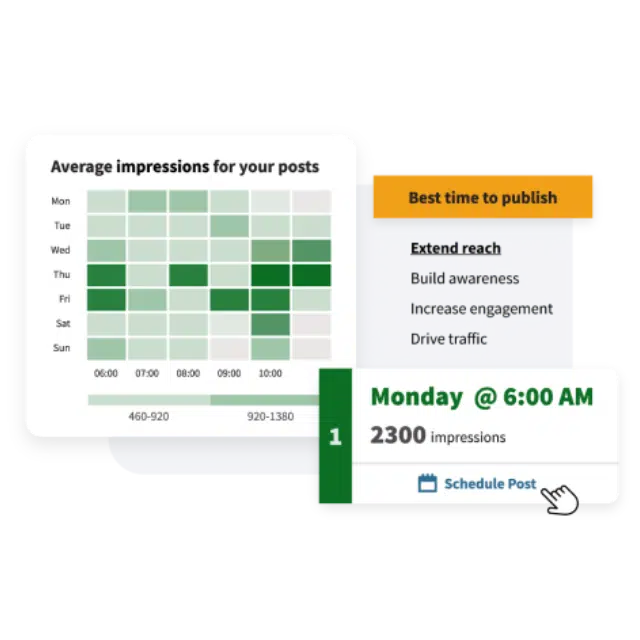
Find out when your audience is online and optimize your posting schedule for maximum engagement. It’s so easy.
Start free 30-day trialBest time to post on Instagram by industry
Your industry defines your audience, and different audiences interact with Instagram content on different schedules. Below, you’ll find the best times to post on Instagram across 10 major industries.
Construction, mining, and manufacturing
According to the most recent data, the best times to post on Instagram in the construction, mining, and manufacturing industry are:
- 3 pm to 6 pm on Tuesdays
- 2 pm to 5 pm on Wednesdays
- 4 pm to 6 pm on Thursdays

Dining, hospitality, and tourism
The best time to post on Instagram in the dining, hospitality, and tourism industry is 11 am to 3 pm on Wednesdays.

Consumer goods and retail
The best times to post on Instagram in consumer goods and retail are:
- 7 am to 11 am on Mondays
- 5 pm to 7 pm on Tuesdays
- 9 am on Thursdays
- 6 am to 10 am / 5 pm to 9 pm on Fridays

Financial services
The best times to post on Instagram for financial institutions are:
- 11 am to 2 pm on Wednesdays
- 11 am to 4 pm on Fridays

Government
The best time to post on Instagram for government agencies and officials is from 12 pm to 3 pm on Thursdays.

Healthcare, pharma, and biotech
The best times to post on Instagram for organizations in the healthcare sector are:
- 1 pm to 3 pm on Mondays
- 9 am to 12 pm on Thursdays
- 8 am to 11 am on Saturdays

Marketing agencies
The best times to post on Instagram for marketing agencies are:
- 9 am to 11 am on Mondays
- 8 am to 10 am on Fridays

Media and entertainment
The best times to post on Instagram in the media and entertainment industry are:
- 1 pm on Sundays
- 7 am to 8 am on Tuesdays
- 5 pm on Wednesdays
- 2 pm to 4 pm on Fridays

Nonprofit
The best times to post on Instagram in the nonprofit sector are:
- 10 am to 1 pm on Wednesdays
- 2 pm to 5 pm on Thursdays

Utilities and energy
The best times to post on Instagram in the utilities and energy industry are:
- 2 PM – 5 PM on Tuesdays
- 1 PM – 3 PM on Thursdays

Best times to post on Instagram for 8 time zones
Arabia Standard Time
The best time to post on Instagram in Arabia Standard Time is from 2 pm to 4 pm on Thursdays.

Atlantic Standard Time
The best time to post on Instagram in AST is from 7 am to 10 am on Thursdays.

Central European Time
The best times to post on Instagram in CET are:
- 7 pm to 8 pm on Mondays
- 4 pm to 6 pm on Thursdays

Central Standard Time
The best times to post on Instagram in CST are:
- 11 am on Wednesdays
- 8 am to 12 pm on Saturdays

Eastern Standard Time
The best time to post on Instagram in EST is 11 am on Saturday.

Mountain Standard Time
The best time to post on Instagram in MST is 9 am on Saturdays.

Pacific Standard Time
The best time to post on Instagram in PST is also 9 am on Saturday.

Coordinated Universal Time
The best times to post on Instagram in UTC are:
- 2 pm to 7 pm on Mondays
- 4 pm to 7 pm on Tuesdays
- 11 am to 4 pm on Thursdays

Factors that influence the best time to post on Instagram
Of course, the best times to post on Instagram are different for every business. It’s not just about your content and posting schedule, but also the habits of your audience, the current social climate, and geographical trends.
Here are a few things to consider when diving into your posting time data.
Your unique audience
Just like every body type is different (and needs different pants) every business audience is different (and needs different attention).
Think about it this way: an online e-commerce business that sells sneakers is going to have a completely different audience than a bank, or a healthcare facility. Sure, there might be some overlap (everyone needs shoes) but trying to target the same audience as a shoe-seller probably won’t work out in the long run.
When your audience is online depends on their unique schedules and habits. People looking for shoes likely do so on weekends or after work. Or, maybe they do it during the weekday while sitting at their desk.
You really can’t know when your audience is most active without looking into your data. Only then will you see what your specific audience tends to do (and not do) online.
Pro Tip: Social listening is one of the best ways to understand your audience.
The built-in Instagram Insights tool will give you some data about when your audience is most online.

Or, you can take advantage of the best time to post on Instagram suggestions and heat maps built into the Hootsuite platform.

As you read through your data, keep an eye on the following:
- Age groups: Younger audiences, like teenagers and young adults, tend to be online late at night and on weekends. Older users might check Instagram early in the morning or during lunch breaks.
- Work schedules: For working professionals, posting during commute times (early morning and late afternoon) or lunch breaks can get you the most engagement.
- Daily routines: Think about what your audience does each day. Fitness fans might check Instagram around their workout times, while parents might be more active during school hours.
The more you know about your audience’s habits, the better equipped you’ll be to reach them when they are most likely to interact with you. And interactions = results (well, most of the time, anyways).
Pro Tip: Use Hootsuite Analytics to learn about your audience’s habits and tailor your posting schedule to fit their routines.
Your industry
Okay, so you understand when your audience is most active online. And you’re already posting at times that are most likely to engage them. Nice work.
Now, it’s time to start thinking of growing that audience — and what better way to do that than to take a peek at your wider industries, and maybe even your competitor’s data.
Your industry will impact the availability of your audience and your best time to post on Instagram data. For example, if you’re a business targeting nurses and doctors, you might see an influx of activity late at night, or super early in the morning.
In the same vein, knowledge workers will be most active before and after work, with a little bump up midday around lunch breaks.
You can use advanced tools like Hootsuite’s industry benchmarking tool to see not only what your audience is doing, but what your competitors’ audience is doing (remember, they might be your audience one day, too).

Use this data to paint a picture of your ideal audience, and begin to learn how to target and engage them with your posting times.
Pro Tip: New to competitor research? Check out our competitor analysis template and guide to dig deep into industry data, trends, and tips.
Time zones
Of course, localization is another important factor in your best time to post on Instagram data. Much of the data we’ve provided in this blog is shown in Pacific Standard Time (PST) but if your business is operating in Eastern Standard Time (EST) or even India Standard Time (IST) you’ll need to convert those times to your specific time zone for accuracy.
If you’re targeting audiences at a global level, this data becomes even more granular.
Consider posting at times that straddle time zones. For example, 6 AM PST is 9 AM EST, which might give you access to both Eastern and Western audiences at the same time. Or, posting at 9 PM PST will reach people in Indian at around 9 AM IST. You get the drift.
Similarly, posting once in the morning for your North American audience, and again in the late evening for your overseas audience, can help open your content up to a more globalized audience.
As always, don’t go about this uninformed. Use your data as a guide to see when your audience is most online, and most engaged.
Algorithm changes
Algorithm changes are the bane of every social media manager’s existence. One day you’re ranking high, and the next you might as well be invisible.
We get it.
But, keeping up with Instagram’s algorithm is key when figuring out the best times to post. The algorithm doesn’t just show posts in order of when they were shared; it prioritizes content it thinks you’ll find most interesting.
Here’s what the Instagram algorithm is prioritizing right now:
- Engagement: Instagram loves posts that get lots of likes, comments, shares, and saves right after being posted. So, posting when your audience is most active can help boost your content.
- Relevance: Instagram decides how relevant each piece of content is by analyzing its fit with trending topics and its timeliness. Posting at peak times ensures that your content is fresh and more likely to appear in their feeds.
- Content type: The algorithm also takes into account the type of content users interact with the most. If your audience prefers videos or Stories, posting these types at optimal times can help your content stand out.
Always stay updated with Instagram’s changes and adjust your strategy accordingly to keep your posts visible.
Geographical events
Geographical events can impact your engagement rate and may require you to revamp your posting time schedule on the fly.
For example, if an earthquake just occurred in your target area and power has been cut, your audience may be on and offline at new hours.
You may also find that a social media crisis, whether related to your brand or industry, or not, can affect how and when your posts are seen.
Holidays, school schedules, and political events can all influence the way people act online, so be on the lookout for any changes in engagement, and adjust your posting times accordingly.
How to find your unique best time to post on Instagram with Hootsuite
Finding your unique best time to post on Instagram is easier than ever with Hootsuite. Use these powerful tools to help you pinpoint the perfect times to share your content for maximum engagement.
Here’s how you can use Hootsuite to find those best time to post on Instagram sweet spots:
Best Time to Publish
Hootsuite’s Best Time to Publish feature takes the guesswork out of scheduling your posts. It analyzes your past performance and audience engagement patterns to recommend the optimal times for your content.
Here’s how to use it in your dashboard:
Navigate to your Hootsuite dashboard and go to Analytics.

From the left-hand menu, choose Best Time to Publish.

Choose the Instagram account you want to see Best Time to Post data on from the dropdown menu.

Here, you’ll see customized heatmaps that dig into your audience’s Instagram habits, plus recommendations on the best days and times to post.
Hootsuite provides specific time slots where your posts are likely to get the most engagement. These insights are based on your unique audience data, ensuring personalized advice.

You can also filter the data by your specific goals, whether it’s for reach, awareness, or engagement. This allows you to tailor the recommendations to what matters most for your Instagram strategy.
Recommended Times in Composer
When you’re ready to create a post, Recommended Times in Composer lets you find out when is the best time to post on Instagram directly in your drafted post.
Here’s how it works:
Start by crafting your Instagram post in the Composer. Add your image, caption, hashtags, and any other elements.

As you’re composing your post, choose Schedule for later in the bottom right corner. Then, select the date and time you’d like your post to go live.

Here, Hootsuite suggests the best times to publish right within the Composer. These suggestions are tailored based on your audience’s activity patterns and your previous post performance.
Choose one of the recommended times, or select a custom time that fits your strategy. With Hootsuite’s data-driven recommendations, you can be confident that you’re posting when your audience is most active.
Save time managing your social media presence with Hootsuite. Publish and schedule posts, find relevant conversions, engage your audience, measure results, and more — all from one dashboard. Try it free today.
The post The best time to post on Instagram: Q1 2025 update [DATA] appeared first on Social Media Marketing & Management Dashboard.
* This article was originally published here
What is Bluesky, and should your business be on it in 2025?
No time to read? Check out the audio version of this post. Bluesky has been top of mind for social media professionals recently. The t...

-
Reddit: Social media platform files to go public BBC News * This article was originally published here
-
Phil Weiser: Hold social media giants accountable for the harm they cause Greeley Tribune * This article was originally published here
-
What The 'Facebook Papers' Reveal About The Social Network's Advertising Business Forbes * This article was originally publi...
